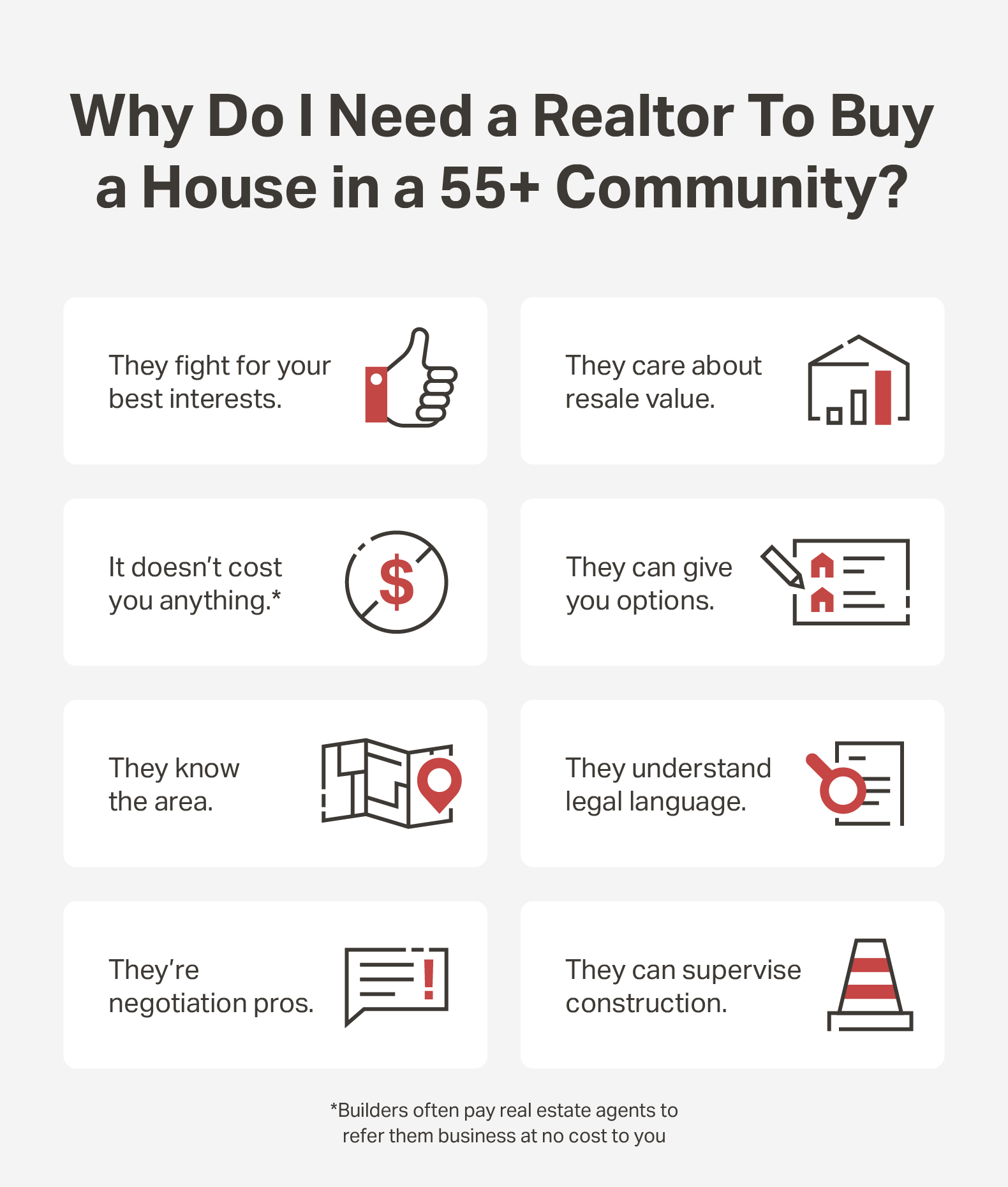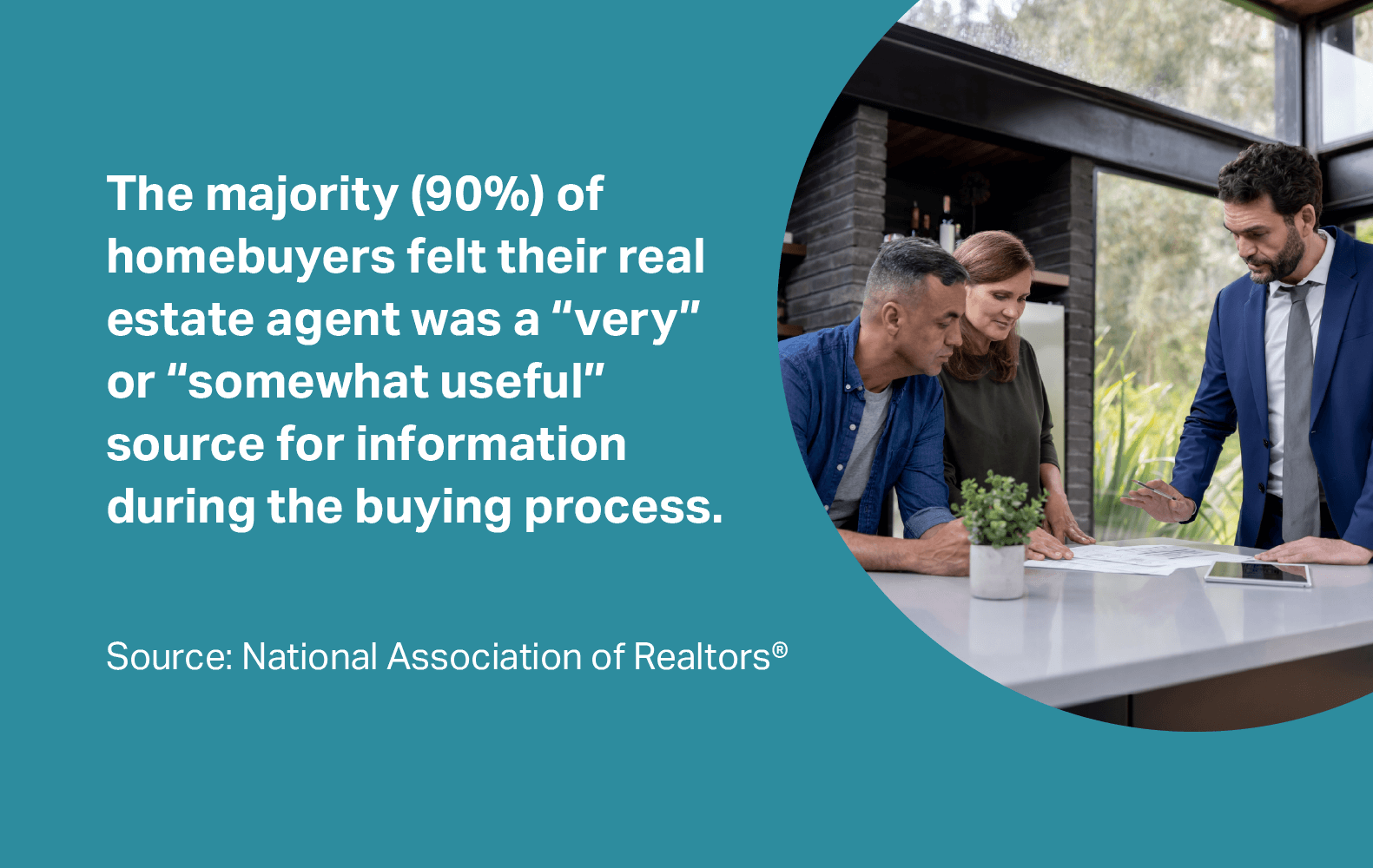When it comes to new construction homes, many buyers think they can save money by buying directly from the builder’s sales agent instead of using a real estate agent. This is especially true in hot markets where homes practically sell themselves, or you’re already paying a lot for a home. But opting to represent yourself when buying a home in a 55+ community often leads to costly mistakes, especially if you are buying from out of state.
If you plan on buying a new construction home for your active retirement lifestyle, consider the following reasons for using a licensed real estate agent before contacting a builder’s sales agent or signing a contract.
Why Buy a House With a Realtor
So why use a realtor when buying a home? It protects you during the buying process. Using a real estate agent when buying property in a 55+ community is often a good idea.
| Pros of buying a house with a realtor | Cons of buying a house with a realtor |
| Your realtor represents you, not the builder. | Sellers may build your realtor’s commission into the price of your new home. |
| The builder will pay for your realtor fees. | You may lose some control of the process to the realtor. |
| A realtor knows the community, builder, negotiation tactics, and contracts. | They may be driven by commissions, leading you to pay more than you want. |
1. The Builder’s Sales Agents Represent the Builder.
The sales agents for 55+ community home builders can be very pleasant, friendly people. They’re happy to show you the community’s selling points and each home’s fabulous upgrade options. However, at the end of the day, the agent’s job is to make sales and watch out for the builder’s interests.
The biggest benefit of using a realtor is having someone on your side to protect you. They may be more familiar with the builder’s reputation or the area than you are, allowing them to ask questions you haven’t thought of. They can also push back on the seller’s suggestions if you’re being oversold.

2. Builders Compensate Real Estate Agents for Referring Them Customers.
While it’s true that real estate agents don’t work for free, in this situation, their fees are not paid by homebuyers. 55+ community builders understand they will pay the homebuyers’ real estate agent fees. They anticipate this cost and factor it into the price of the new home, whether you use a real estate agent or not.
NOTE: As of this publication, it is common practice for the seller to pay the entire commission to the selling agent, who then splits half of it with the buyer’s agent. However, in October of 2023, a federal jury ruled that requiring the seller’s agent was anticompetitive and artificially inflated real estate commissions. As a result, the NAR agreed to implement a policy where buyers negotiate directly with the buyer’s agent to determine the amount and manner in which the buyer’s agent is compensated in a transaction. As a result, possible changes to the commission process may be coming. Discuss commissions with your real estate agent directly before beginning the homebuying process.
3. A Real Estate Agent Understands the Community.
A real estate agent familiar with buying and selling in a given community will have the expertise to help you make better decisions when choosing your lot, floor plan, and any optional upgrades.
They also understand the surrounding area. A local real estate agent can help you find a 55+ community near the amenities you want, such as health care facilities, parks, or airports for easy traveling. They can also tell you if a community is built near an outdoor concert venue so you know about potential noise issues before buying.
This is especially important if you aren’t familiar with the builder, the 55+ community, or even the area you’re moving to. If you’re looking for advice from real estate agents with experience in active adult communities, you can find them on each of the 55places community listings.
4. A Real Estate Agent Can Negotiate To Get You a Better Deal.
While you may consider yourself a savvy negotiator, real estate agents have specific experience within a community, which gives them an edge. They know what promotions may be coming up and understand the community’s recent sales record. This is especially helpful when buying a home in another state where you may know less about the area.
5. A Real Estate Agent Will Consider Your Investment and the Home’s Resale Potential.
Builder’s sales agents primarily focus on the sale at hand. A good real estate agent will have a more long-term interest in your investment. They’ll want to help you buy a home with a strong resale value down the line, especially because they might be the one you call to help sell that home someday.
Your agent will understand the amenities and upgrades add value and explain the potential return on your investment. For example, if you have a limited budget for upgrades, they can help you prioritize the ones that will add the most value to your home.

6. A Real Estate Agent Can Explore All of Your Options.
Sales agents will only tell you all the options available for new home construction in their communities. Once your real estate agent knows what you want, they can help you find it—even if that means expanding the search to a resale home or to neighboring communities.
They also have connections to people you may need to hire during the process of moving in, such as mortgage brokers, moving companies, interior designers, and more.
7. A Real Estate Agent Will Help You Understand the Contract.
Even if you’ve bought and sold real estate before, the sales contract will likely have some confusing wording. Misunderstanding the legalese can lead to expensive mistakes, particularly if there are problems during construction. A real estate agent can help you fully understand your agreement before signing it.
Real estate agents can also help you make sense of a 55+ community’s bylaws. Some communities may have restrictions about children, pets, or guests and rules regarding what you can do in your yard. Understanding these restrictions before moving in can help you avoid potential issues in the future.
8. A Real Estate Agent Can Watch Over Your Home During Construction.
When buying a new construction home, keep an eye on the progress during the building stage. This is easier said than done if you’re relocating to the area and live far away. Fortunately, many real estate agents are happy to watch over your new home, ensure upgrades are on track, and even send you progress reports.
Real estate agents can also hold the builder accountable if something isn’t going right during construction. For example, you may show up to look at your build only to find the walls are painted the wrong color. A real estate agent can fight on your behalf to get the problem corrected before you move in.
Why Buy a House Without a Realtor?
You aren’t legally obligated to use a realtor when buying a home, and some people may opt not to use one when buying a new construction home.
- Sellers may be willing to negotiate a lower price. As of May 2024, sellers are responsible for paying the buyer’s agent’s commission. If you aren’t using a realtor, you may be able to negotiate the price down.
- You retain complete control of the process. A real estate agent acts as an intermediary between you and the seller. You tell them what you want, and they go find it. Some people, especially in the age of internet listings, want complete control over the process. Not using a realtor allows you to maintain control.
| Pros of buying a house without a realtor | Cons of buying a house without a realtor |
| Sellers may be willing to negotiate a lower price. | You may overpay if you don’t know the market. |
| You retain complete control of the process. | You may skip important steps, such as inspections that cost you money. |
How To Determine If You Need a Realtor
Whether or not you need a realtor varies based on your situation. To determine if you need a realtor, answer the following questions:
- Do I know the area and the 55+ community market well? Agents live and breathe this every day, so they can help ensure you make a wise investment and help you avoid buying a home that is overpriced or a bad investment.
- Do I know how to negotiate for real estate? If yes, you may not need a realtor to mediate the sale of your new home. Otherwise, you may want a realtor to avoid overpaying for your new home.
- Do I know how to navigate the paperwork involved? Buying a home involves a lot of paperwork, from a purchase agreement to inspection reports. If you are comfortable reading legal documents and know where the important content is, you might not need a realtor.
- Do you have connections in the industry? Real estate agents know a lot of people who can support you throughout the process. If you know someone who works for the builder or someone who can act as a contractor or home inspector for you, you may not need a realtor.
Find a Real Estate Agent With 55places
55places has helped thousands of active adults find their ideal 55+ community thanks to our extensive network of agents specializing in 55+ community sales. Whether you’re renting, buying, or selling, our agents are available to help. Reach out today.
FAQ
Learn more about buying a home in a 55+ community below.
Can I Pay Cash for a New Home in a 55+ Community?
Absolutely! There are many ways to pay for a home in a 55+ community, including home loans and cash payments. It’s important to consider all your options carefully before making a purchase.
Should I Hire a Real Estate Lawyer To Buy a House?
You are not required to use a real estate lawyer when buying a home in most states, but it can be helpful, especially in a complicated sale. Real estate lawyers oversee the sale’s legal aspects and ensure it goes smoothly.
Is It Worth It To Hire a Buyer’s Agent When Buying a House?
For most people, yes. If you are unfamiliar with the area, your 55+ community builder, or the homebuying process, a buyer’s agent’s expertise can protect you from making costly mistakes.
Will I Save Money If I Buy a House Without an Agent?
Since the builder pays your real estate agent’s commission (as of May 2024), you likely won’t save anything in realtor commissions.
You could potentially save money if the seller is willing to negotiate down the price since they won’t be paying your agent’s commission. However, you may lose money in the long run by paying too much for a house because you don’t know the area, improperly negotiating, or purchasing a home that needs repairs.
Is Buying a House Without a Realtor Worth It?
For most people, the answer is probably not. If you don’t know what you are doing, you may get taken advantage of and ultimately lose money.







